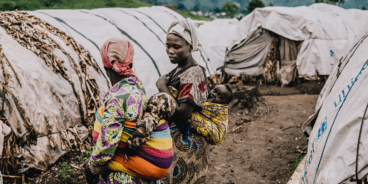
Atrocity Alert No. 107: Yemen, Nigeria and Syria
Atrocity Alert is a weekly publication by the Global Centre for the Responsibility to Protect highlighting situations where populations are at risk of, or are enduring, mass atrocity crimes.
Famine looms in Yemen as threat to Hodeidah port grows
As the result of an armed conflict that has raged for over three years, Yemen is now the world’s worst humanitarian crisis. Last Thursday, 24 May, the UN Under-Secretary-General for Humanitarian Affairs and Emergency Relief Coordinator warned that by the end of the year a further 10 million people could join the 8.4 million already at risk of famine.
In particular, an impending military offensive on the Red Sea port of Hodeidah could put the lives of hundreds of thousands of civilians at risk. Hodeidah is a city of 700,000 people and is the entry point for 70 percent of the aid upon which over 22 million Yemenis depend. Yemeni government forces, backed by a Saudi Arabia and United Arab Emirates (UAE)-led military coalition, have made significant military advances along the coast towards the city, and according to the UN Office for the Coordination of Humanitarian Affairs (OCHA), as of 28 May fierce fighting and intense airstrikes were continuing near the city.
OCHA has reported that an estimated 140,000 people are at risk of being displaced from three southern Hodeidah districts – Zabid, Al-Garrahi and At-Tuhayat – and if fighting reaches the city an additional 200,000 people could be forced to flee. There have been reports that as the offensive nears the port city, Houthi fighters have fired indiscriminate weapons into civilian neighborhoods and allegedly mined roads, preventing civilians from leaving. There are also grave fears for the safety of civilians given that previous Saudi/UAE-led coalition airstrikes in civilian-populated areas have led to large-scale casualties and the destruction of essential civilian infrastructure.
The UN Special Envoy for Yemen is expected to present a plan for political negotiations to the UN Security Council (UNSC) next month. It is of the utmost importance that the UNSC adopt a resolution based upon that plan and intensify efforts to bring all sides to the negotiating table. Meanwhile, governments with strong political, military and economic ties to parties to the conflict – in particular the United States, United Kingdom and Iran – must emphasize the importance of avoiding any further military escalation around the port of Hodeidah, demand all parties uphold their responsibility to protect civilians, and ensure they strictly adhere to International Humanitarian Law.
Civilians suffer during Nigeria’s war on Boko Haram
Last Thursday, 24 May, Amnesty International published a report that found that members of the Nigerian military and Civilian Joint Task Force have carried out “systematic patterns of violence and abuse” against civilian populations, including war crimes and possible crimes against humanity. These crimes have been committed since early 2015 during military operations to recapture territory from the extremist armed group Boko Haram in the northeast of Nigeria.
According to the report, while battling Boko Haram members of the security forces also committed attacks on civilians and engaged in the forcible transfer of populations. At so-called “satellite camps” for internally displaced persons and within detention facilities for suspected Boko Haram members and sympathizers, some civilians also endured arbitrary detention, torture, severe restrictions on freedom of movement, starvation, rape and sexual violence.
The Nigerian government’s nine-year conflict with Boko Haram has claimed more than 20,000 lives, and civilians have endured widespread atrocities committed by the extremist group. Nevertheless, it is essential that those involved in military operations against Boko Haram mitigate the risk to civilians and strictly adhere to their obligations under International Humanitarian and Human Rights Law.
The Nigerian government should urgently undertake comprehensive security sector reform to ensure that the army and affiliated groups, such as the Civilian Joint Task Force, are trained in the protection of civilians. Those responsible for abuses and violations of human rights must be held accountable.
Syria’s presidency of the Conference on Disarmament
On Monday, 28 May, Syria assumed the rotating monthly presidency of the Conference on Disarmament, a multilateral forum established by the international community to address arms control and disarmament issues. The Conference on Disarmament was instrumental in negotiating the 1993 Chemical Weapons Convention and the Anti-Personnel Landmines Convention, among other achievements.
Since the start of the Syrian conflict in 2011, the government of Bashar al-Assad has committed war crimes and crimes against humanity as a matter of state policy, including the use of indiscriminate and illegal weapons against civilian populations. In particular, the Syrian government has used prohibited chemical weapons – including chlorine and sarin gas – on numerous occasions. The government’s routine use of other indiscriminate weapons in civilian populated areas, including improvised “barrel bombs” loaded with heavy shrapnel, has also been extensively documented by the UN Commission of Inquiry and various human rights organizations.
Over 500,000 people have now been killed in Syria’s seven-year civil war and over 12 million displaced. The use of indiscriminate and illegal weapons demonstrates the total disregard for international law by parties to the conflict and has greatly contributed to the suffering of the Syrian people.
Although UN member states cannot remove Syria as rotating president of the Conference on Disarmament, they should reinvigorate efforts to end impunity. States should call for the mobilization of the UN Secretary-General’s existing mechanism for investigation of the alleged use of chemical and biological weapons. All UN member states should also actively support the UN General Assembly-mandated International, Impartial and Independent Mechanism to assist in the investigation and prosecution of all perpetrators of atrocities in Syria.
Related Publications


